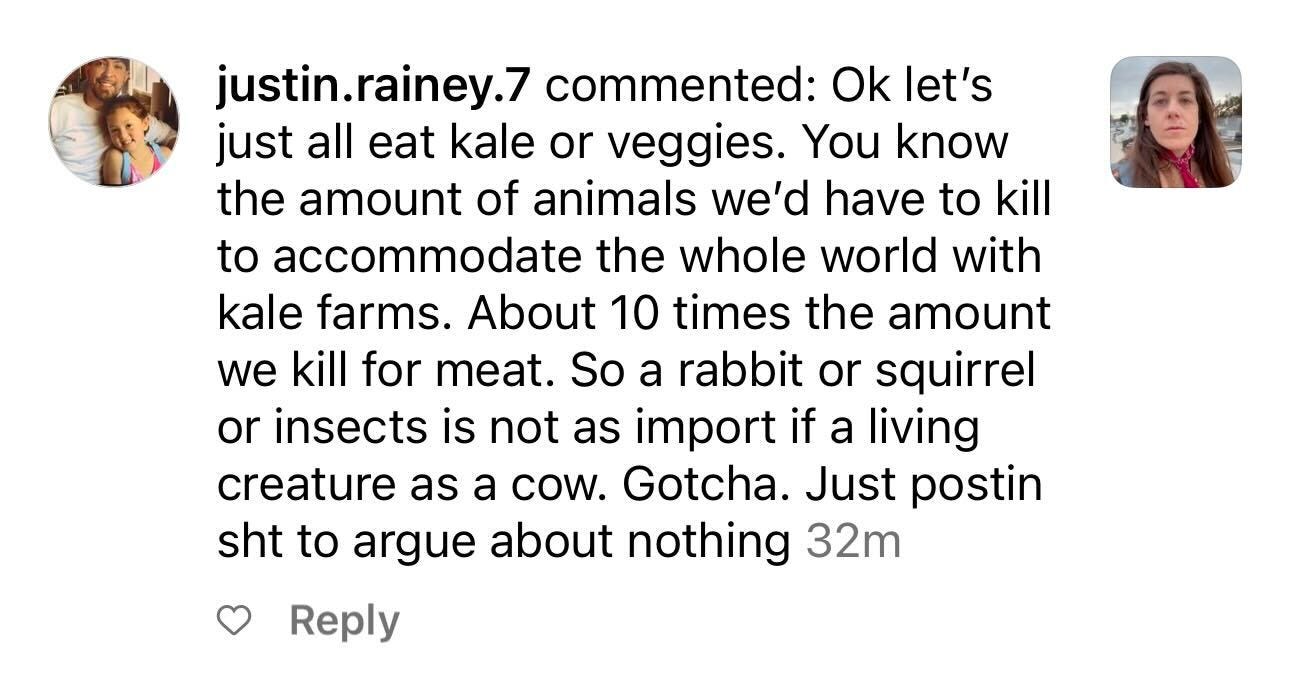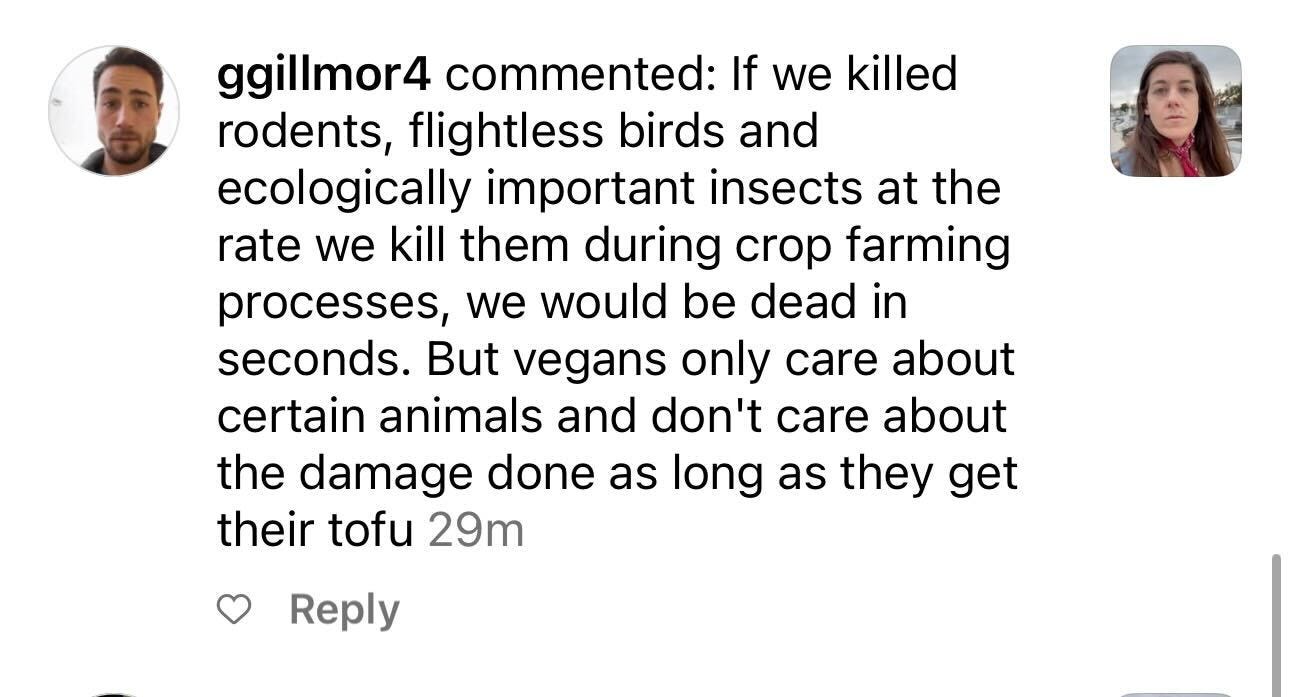Every time one of my reels goes viral on Instagram, my comments section is inundated with this anti-vegan argument:
And those are just from earlier today.
This is the “crop deaths tho” argument, which has been gaining steam for the last decade.
We can trace its origins back to 2003, but Ted Nugent popularized it with Joe Rogan in the worst conversation on veganism I’ve ever seen.
In this article, I don’t want to debunk “crop deaths tho” (frankly I’ve debunked it thousands of times, but that only seems to make it stronger).
Today I want to analyze its popularity in the first place.
Why are meat eaters obsessed with this argument?
It reduces guilt
To grok this, we need to understand how veganism makes meat eaters feel. You’re probably familiar with the “meat paradox,” which is the cognitive dissonance caused by believing that it’s wrong to hurt animals, while simultaneously eating meat.
When vegans aren’t around, meat eaters can comfortably bury their cognitive dissonance, but as soon as veganism is mentioned, it becomes impossible to ignore.
One study found 15 strategies omnivores employ to prevent and reduce the moral guilt associated with eating meat, and one is attacking the person who triggered the discomfort: aka the vegan.
Unless you were born vegan, you’ve probably done this before.
Growing up, I had one vegetarian friend named Brian, and we were constantly arguing over the ethics of eating animals (maybe that’s why I’m so drawn to street outreach), and at the time I thought I was arguing because I wanted to prove him wrong, but I now realize it was to soothe my guilty conscious about eating meat.
Whenever we’re confronted with someone we think of as “better than us,” it’s natural to try to take them down a few notches to equalize our self-esteem.
But there are plenty of ways to knock vegans off our high carriages, from insulting our appearance to accusing us of wearing leather boots, so why does “crop deaths tho” reign supreme?
It’s a satisfying “gotcha” that feels original
There’s a reason debates are so popular on YouTube. The biggest debaters aren’t the most informed, they’re the best at embarrassing the other side.
We love watching people get demolished by facts and logic.
“Crop deaths tho” provides the perfect outlet for meat eater’s sense of “owning vegans.”
And because they’ve seen it on TV or a viral social media clip, they don’t realize that every vegan has heard it a million times before.
It’s the same sense of satisfaction we derive from learning about conspiracies: that we’re part of a secret club that knows “the truth” and everyone else believes the lies promulgated by society.
We can see similar talking points in discussions about climate change: that electric cars are worse for the environment (they’re not) or that wind turbines use more resources than oil (they don’t).
Everyone wants to feel smart and superior, so they jump at the chance to do so when veganism comes up.
It’s a “fuck you” to people who care
I remember looking up to my babysitter when I was a kid. She was the epitome of cool. She smoked cigarettes, drove too fast, blasted Limp Bizkit, and encouraged us to lie to our parents.
In short: she didn’t give a fuck.
She lived life on her own terms, and she had the confidence to ignore everyone and do what she wanted. At least, that’s what it felt like at the time.
Looking back, I’m sure she struggled with insecurity like every 14-year-old girl in America. But she didn’t show it, and that’s what made her so cool.
We can see examples of this paradigm throughout popular culture: from the success of “The Subtle Art of Not Giving a F*ck” by Mark Manson, to a teenage character in “Paddington 2” who abandons his favorite hobby because “it’s not cool to care about building trains.”
So when an omnivore encounters a vegan, not only do they want to bring them down, but they want to inform them that caring about animals is a waste of time, and doing so actually makes the problem worse.
It’s a lot easier, and cooler, for nonvegans to pretend not to care about farmed animals than to analyze their discomfort surrounding eating meat.
In Pax Fauna’s study on attitudes toward animal farming, they found that meat eaters care more than they initially let on.
We can see this operate in other social justice issues, too. Traditionalists often claim that feminism was bad for women because women are less happy now than they used to be. Take that, feminists! All your hard work was for nothing.
The irony is, by obsessing over crop deaths, meat eaters are telling us something important: they do care about animals dying.
They're just desperately looking for ways to justify killing them anyway.
And that's what makes this argument so perfect for them - it lets them pretend they're exposing vegan hypocrisy while avoiding their own discomfort. It's not about crop deaths. It's about finding a way, any way, to keep not caring.
While they're busy trying to prove caring is uncool, I'm grateful to be part of a community that's not afraid to care deeply and act boldly.
People who are willing to face the uncomfortable reality of what happens to farmed animals and fight to change it.
That's what real courage looks like.
Thank you for being part of it!
What I’m Reading: Animal Liberation Now by Peter Singer
I know, I know, can I even call myself a well-educated animal rights advocate when I haven’t read the book that started our modern movement?
Only about halfway through, so I won’t do a full review here (that’s going to be my next YouTube video), but I’m enjoying it so far.
If you have thoughts about the book or Peter Singer, please send them my way!
Until next time,
Natalie








Thanks for writing this. I have noticed this statement and its attempt to gain a sense of momentum; but I don't see how it holds any weight? I understand your points and approach that you presented in the piece itself, but if I isolate the argument by itself it has little to any significant meaning, am I wrong in stating that? When a carnist elects to use this "well what about crop deaths" to justify their consumption for meat and or demonstrate their lack of comprehending the complex-multifaceted arrangement of sharing this planet with other living beings. In other words, is it that hard for people to step back and make an attempt to empathize, just a touch for animals? I am not suggesting moral or religious tones here either, just a quick glimpse into the life of animals who are confined, and killed 24/7 for humans. If the carnist is trying to get me to see an empathetic perspective on the "crop deaths" or "insect deaths" I am having trouble to see that comparatively. Help me understand.
Thanks -- a good piece about the psychology of the crop deaths retort.
Here's something I wrote about the complex issue of crop deaths: https://www.uvic.ca/law/asri/resources-education/research-outputs/should-vegans-eat-meat-to-kill-fewer-animals/index.php# .
Regarding your expression "high carriages" instead of "high horses". I think this sounds a little contrived, and there's also a problem: a carriage is typically a horse-drawn vehicle, so you're not eliminating the association with using animals, if that's what you wanted to do.
As you may know, Peter Singer, being a utilitarian, is strictly speaking not an advocate of animal rights. The landmark work on animal rights is Tom Regan's The Case for Animal Rights (1983), 400 pages in length and not as easy a read as Singer's book. A very basic introduction to Regan's view can be found here: http://www.animal-rights-library.com/texts-m/regan03.htm .